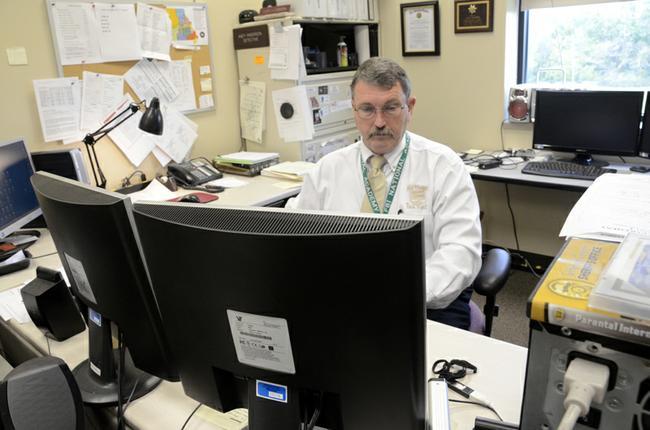It starts with a profile page.
However, Detective Andy Anderson doesn’t make a profile for himself. Instead, he and his colleagues make a profile for a fake 13- or 14-year-old.
After making this profile, they wait.
“We’ll hang out and wait for adults to come and talk and we’ll just let them lead the investigation,” Anderson said. “It’s amazing how quickly that will happen sometimes — sometimes in a matter of minutes.”
Anderson serves as coordinator of the Boone County Sheriff’s Department Cyber Crimes Task Force, where he and four other detectives investigate internet crimes.
“We’ll look to see if that individual is one to perpetrate a crime against the kid and if they are, we’ll try to resist a little bit, but our goal is to get them to get us,” Anderson said. “If they want to meet, we’ll set up a meeting and have surveillance and that kind of stuff. If they commit a crime online, we’ll have to trace those transmissions back to wherever the computer was, figure out who was sitting at the computer.”
The task force focuses mainly on internet crimes targeting children, Anderson said.
“The reason for that is that we are primarily grant-funded and the people who give us the money to work these cases want us to focus on crimes against kids, so we do,” Anderson said. “Also, our resources are very limited, so we have to focus on who is in the most danger and typically that’s kids.”
The idea for a task force came after Anderson worked with a local prosecutor on a child pornography case. After contacting law enforcement agencies throughout the area, Anderson found that they all had problems with internet crimes but lacked the resources and knowledge to tackle them. Officially starting in 2007, the task force has worked approximately 700 investigations.
With technology’s presence in society growing, cyber crimes against children have reached epidemic proportions, Anderson said.
“In 2008, (Boone County Sheriff’s Department detective Tracy Perkins) was doing some research on child pornography being offered for dissemination through file-sharing programs,” Anderson said. “She looked at records for a six-month period and was able to identify right at 250,000 computers in Missouri alone that were offering to share child pornography that had a victim that had already been identified as child porn — in other words, a police officer or law enforcement had looked at it and said ‘This is a child.'”
Investigations vary from case to case, and many take months to complete.
Perkins works as a detective with the task force and has worked with tracking the sharing of child pornography.
“Every time someone continues to share these files, the victim continues to be molested,” Perkins said. “You have to try and stop that chain, but once you’ve stopped one, another one comes up. There’s no end to that situation. We try our best but we’re never going to stop all of it.”
Despite the task force’s work, the epidemic of cyber crimes against children still continues, Anderson said.
“We’re not even making a dent in the problem,” Anderson said. “We’re getting the ones that we can and when we catch a suspect doing that, at the very least we may be able to protect the kids by putting them in jail. But, then the reality of all those numbers, we’re not putting a dent in it. We need more resources in Missouri and around the country. We need more cops dedicated to working these kinds of crimes.”
One of the main problems is more and more children attaining technology at young ages who lack the preparation necessary to stay safe. The issue of cyber crimes is something society will have to face, Anderson said.
“Right now, we’re learning how big the problem is, we’re learning how devastating it is, and hopefully from all of this, society will realize that we’re going to have to put some resources to this problem before it gets way out of hand,” Anderson said. “One of those problems is that parents are giving kids technology that kids are not ready to handle …We wouldn’t think of putting a 12-year-old kid in a car or even a 16-year-old kid without giving them some kind of lesson. But, we’re giving them a computer ”
In addition to investigating cases, the task force gives presentations to educate parents, kids and community members. Since 2007, the task force has given more than 300 presentations.
“One of our main goals is to educate parents and kids about this type of thing,” Perkins said. “There are kids today who exploit themselves and think it’s socially right, but it’s not. It’s a crime.”








